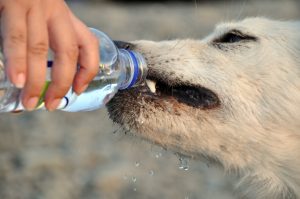 How much water do you drink per day? Health experts tell us we need to drink at least ½ gallon of water per day to replenish our fluids. Because the human body is 60% to 80% water, it’s important to constantly hydrate particularly if you are out in the heat.
How much water do you drink per day? Health experts tell us we need to drink at least ½ gallon of water per day to replenish our fluids. Because the human body is 60% to 80% water, it’s important to constantly hydrate particularly if you are out in the heat.
Dogs too need plenty of water. Although it depends on your dog’s size, activity level and age, the general rule of thumb is that dogs need to drink between 8.5 to 17 ounces of water per 10 pounds, meaning a 50-pound dog needs between 42 and 84 ounces of liquid refreshment to stay happy and hydrated. Just like humans, dogs can go a long time without food to survive, but not water. Keeping your dog hydrated is important to your dog’s overall health.
The Benefits of Drinking Water in Dogs
Water serves many purposes for a dog’s health including:
- Facilitates every bodily function including food digestion, a source of fresh oxygen, and keeps blood flowing through his veins. Because blood is mostly water, a dog’s brain and muscles need water to work well.
- Flushes toxins which could damage a dog’s heart and kidneys.
- Helps to regulate a dog’s body temperature and keep him cool.
- Keeps his nose wet to increase his sense of smell.
Signs of Dehydration and Heat Stroke
Because you don’t watch your dog’s water intake all day, it may be hard to gauge how much water he is drinking. Here are some common signs your dog may be dehydrated:
- Vomiting
- Diarrhea
- Sunken eyes
- Lethargy
- Loss of appetite
- Dry mouth
- Lack of skin pliability
- Excessive panting
- Wrinkled skin
- Loose skin (loss of elasticity)
Senior dogs, diabetic dogs, pregnant or nursing dogs, and those with kidney disorders or infectious diseases are more prone to dehydration. Because a dog’s metabolism slow as they age, it’s even more important to keep them hydrated.
Conversely, if your dog is drinking water excessively, you may want to talk to your vet.
Preventing Dog Dehydration
- Dogs lose a lot of water through panting. Keep clean water in your dog’s bowl at all times and rinse his water bowl often to prevent bacteria from forming.
- Consider a weighted bowl if your dog likes to tip his water bowl over. If your dog is outside a lot, provide at least two sources of water in case one gets knocked over.
- If you’re exercising or walking your dog, bring bottles of water.
- If your dog doesn’t like water, add a bit of chicken broth.
- Keep the lid on your toilet bowl closed. Dogs have a bad habit of drinking toilet water which can contain bacteria.
If your dog is slightly dehydrated, do not let him start gulping water – give him a few sips every few minutes. Additionally, add some electrolytes to his water. While water helps in replenishing a lot of nutrients, electrolyte can do the job more quickly.
If your dog is severely dehydrated, get him to the vet immediately. IV fluids may be needed.
Keeping your senior dog healthy requires good hydration, lots of exercise and good nutrition. Following these three guidelines will help to keep your best friend around for as long as possible!
